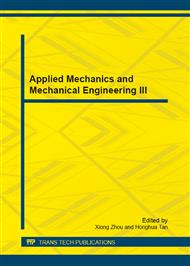p.1154
p.1160
p.1166
p.1173
p.1180
p.1188
p.1195
p.1201
p.1205
Significant Factors Identification for Particle Swarm Optimization Algorithm to Solving the Design Optimization Problem of a Four-Bar Linkage for Path Generation
Abstract:
Particle swarm optimization (PSO) is a well-known population-based searching algorithm to solving optimization problems. This paper aims at identifying significant control factors for PSO to solving the design optimization problem of a four-bar linkage for path generation. Control factors considered herein are inertial weight, acceleration coefficients, breeding operation, and the number of population. A full factorial design of experiments is used to construct a set of experiments. Experimental results are analyzed with the analysis of variance method. According to the results obtained in this paper, breeding operation and the interaction between breeding operation and acceleration coefficients are significant. Inertial weight, acceleration coefficients, the number of population, and the other interactions are not significant. For the design optimization problem discussed herein, it is suggested to adopt breeding operation strategy and apply constant acceleration coefficients to increase significantly PSO’s performance and robustness. Type of inertial weight and the number of population do not affect PSO’s performance and robustness significantly.
Info:
Periodical:
Pages:
1180-1187
Citation:
Online since:
December 2012
Authors:
Price:
Сopyright:
© 2013 Trans Tech Publications Ltd. All Rights Reserved
Share:
Citation:


